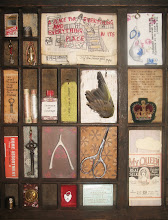
 The piece below I made a few years ago as part of a degree module, making a cloth, not exactly, but at the time, and i still am, I was soooo inspired by the work of Mark Dion , and so rather than all these precious things gathering dust, and due to a lack of specimen display case in my ownership, I thought this might preserve them better.
The piece below I made a few years ago as part of a degree module, making a cloth, not exactly, but at the time, and i still am, I was soooo inspired by the work of Mark Dion , and so rather than all these precious things gathering dust, and due to a lack of specimen display case in my ownership, I thought this might preserve them better.
I'm reminded of this story from Daisaku Ikeda's 2009 Peace Proposal (from the Edo Period)
'One day, Doi picked up a discarded scrap of Chinese silk and handed it to one of his samurai retainers. Many laughed at this seemingly insignificant gesture. Several years later, when Doi asked the samurai about the piece of silk, he produced it, having carefully stored it. Doi praised the samurai and increased his annual stipend by 300 koku (the standard unit of wealth in Japan at the time). Doi then explained his actions.
This fabric was produced by Chinese farmers who plucked mulberry leaves to raise silkworms and spin thread. It came into the hands of Chinese traders, crossed over the great distance of sea to reach Japan, passed through the hands of the people of Nagasaki, was purchased by merchants in Kyoto or Osaka, and finally reached Edo [present-day Tokyo]. One cannot but be struck by the enormous human effort by which it reached us, and thus to discard it as a worthless scrap is a fearful thing inviting the rebuke of heaven.
To empathetically connect, through a scrap of fabric, with the lives of farmers working in mulberry fields in distant China--'



















